
7 minute read
New Tools for School
New Tools for School
UCI Arts students use technology and spaces to explore the human experience
Students at the Claire Trevor School of the Arts explore the human experience through a variety of creative avenues by using skills as classically trained fine artists, but also through emerging technology and media. The school offers a variety of equipment and spaces that utilize new tech and multimedia tools such as the Experimental Media Performance Lab (xMPL), the motion capture studio, and the Meyer Sound Design Studio, among others. Students from all four departments have access to a range of media that allows them to reshape how art is created and experienced. We asked a few students who are utilizing these tools and spaces to share with us.
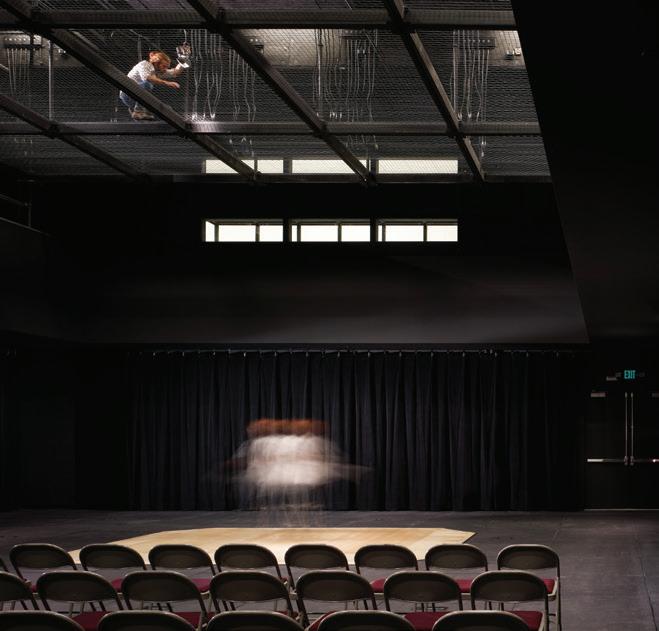
Experimental Media Performance Lab (xMPL)

The CAM Lighting Lab
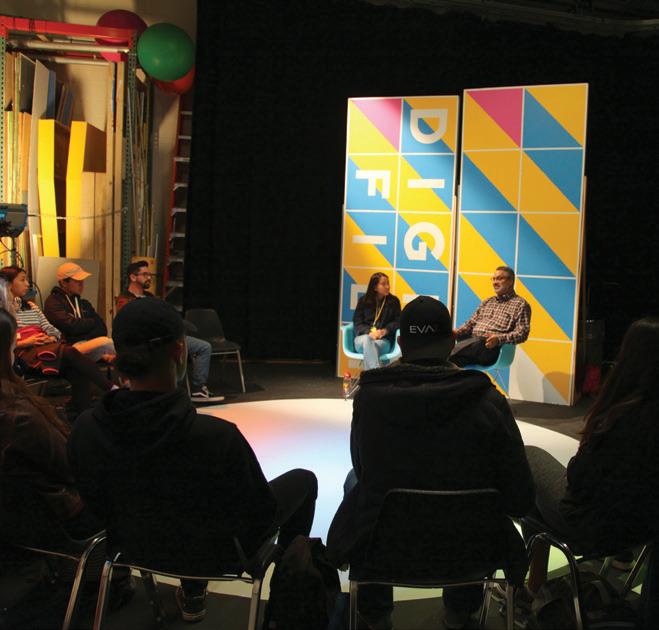
The DigiFilm Sound Studio
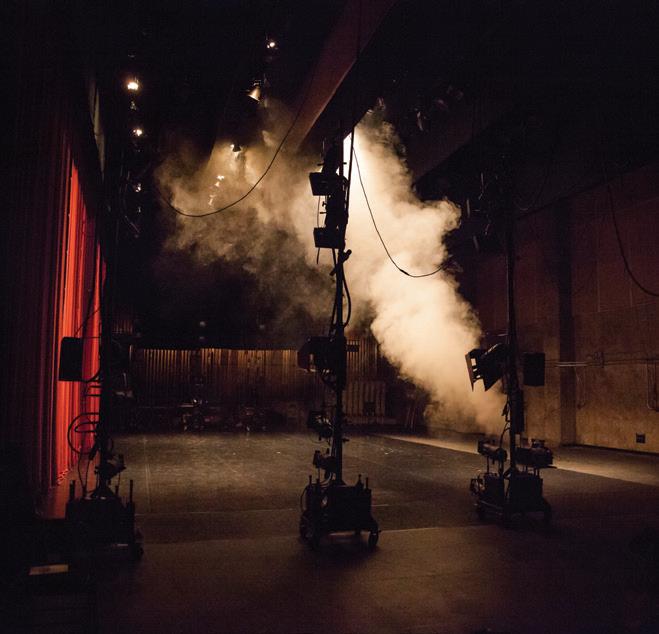
Claire Trevor Theatre (backstage)
Corey Cao Nguyen
Department of Art B.A., Film and Media Studies (Humanities), Minor in Digital Filmmaking. Anticipated graduation, Spring 2020.

Career Goals: I hope to continue my work as a cinematographer. I want to keep shooting international documentaries and give a voice to underrepresented minority groups by sharing their stories.
Last summer, Corey Nguyen was chosen to participate in a joint partnership between the Department of Art’s DigiFilm program and Social Ecology called the Global Service Scholar program. Nguyen traveled to South Africa with a group of 10 UCI undergraduate researchers to make a documentary. During that time, Nguyen worked at different sites focused on community activism and social justice, jumping between taxis and Uber rides to capture the crucial moments. “I spent the most time at a Women’s Empowerment Farm called the Sakulwhazi Women’s Hub,” recalled Nguyen. “At the farm, the founder, a loving black woman named Momma Rose, started the Sakulwhazi Hub as a way to teach women how to farm and bead to create generational wealth for local Cape Town women.” Nguyen spent the time in Cape Town, both filming and exploring the natural beauty of South Africa. He is currently working through several hours of footage to tell a compelling story.
Tell us about the technology you use:
On the last trip, I took a C100 and Canon Lens package from the Digital Filmmaking program. This year, having seen my work from the previous year, Canon offered to sponsor my trip, providing me with a loaned C300 camera and lenses from Canon Burbank. The technology and support from Canon were crucial to capturing the stunning beauty of Cape Town. I’m incredibly grateful to Aaron McNally from Canon Burbank for arranging the package. For editing, I utilize the post-production facilities in the Digital Filmmaking Post-Lab for all footage cutting and sound mixing services.
Jehbreal Jackson
Department of Dance M.F.A. in Dance, William J. Gillespie Ballet Scholar. Anticipated graduation, Spring 2020.
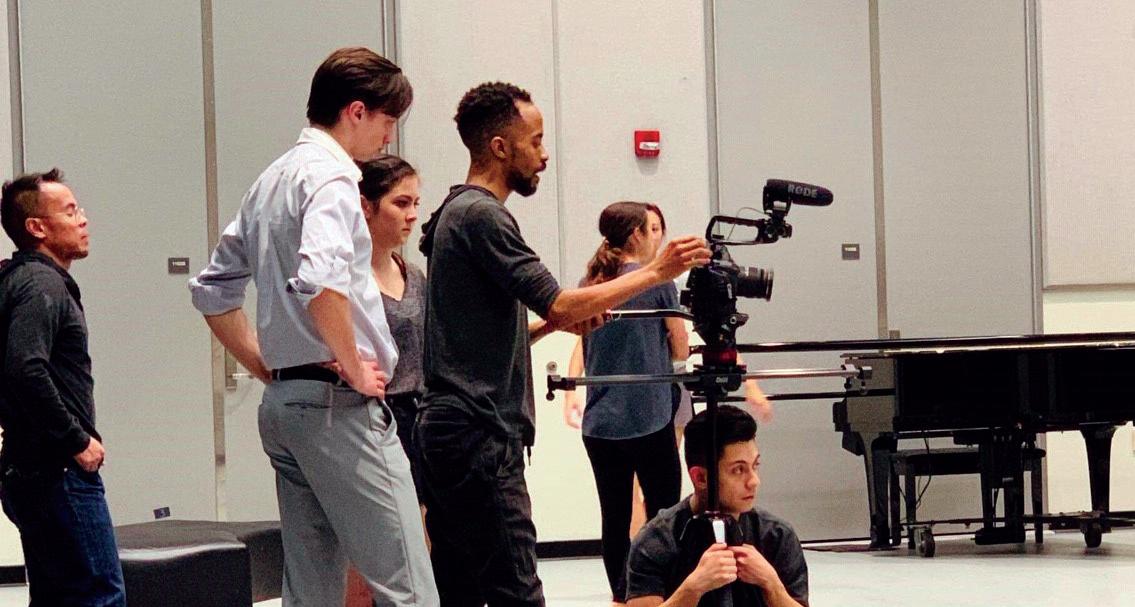
Career Goals: I want to create original story ballets for the film medium that are beneficial and healing. I hope to encourage emotional well-being of all of those that experience my work.
The most exciting project Jehbreal Jackson has ever created in his career is his M.F.A. thesis project, a feature film titled CANON. “The film really allows me to combine all of the skills and loves that I’ve accumulated through my life and put them into one place,” says Jackson. CANON is an original story ballet that Jackson wrote, choreographed, directed, shot (when he wasn’t acting), sang, and danced in. “It required and integrated every aspect of myself!” The project reflects course work taught by the dance department faculty in Screendance, an overview of dance for film and choreography for the camera. As part of his practice, Jackson utilizes the motion capture dance studio extensively for scenes that were meant to be in surreal environments. The space is entirely green, including the Marley dance floors, to achieve special effects for the film. Overall, he makes sure to take advantage of the technology available in dance.
Why is CTSA a good fit for you?
The level of artistry and scholarship on this campus is astonishing! As my work is interdisciplinary, I love how seamlessly I can float between the departments. As a part of my thesis, I study Shakespeare for my research to write narrative ballets. There is a Shakespeare Center on campus, which is like heaven for me. From the incredible dance faculty, talented dance students and technology explicitly made for dance to the amazing drama faculty, actors and Shakespearean scholars – I have found the perfect place in which to feed my creativity and produce art.
Gretchen Diane Ugalde
Department of Drama B.A. in Drama, Emphasis in Scenic Design. Graduated, Spring 2019, Continuing Education Student.
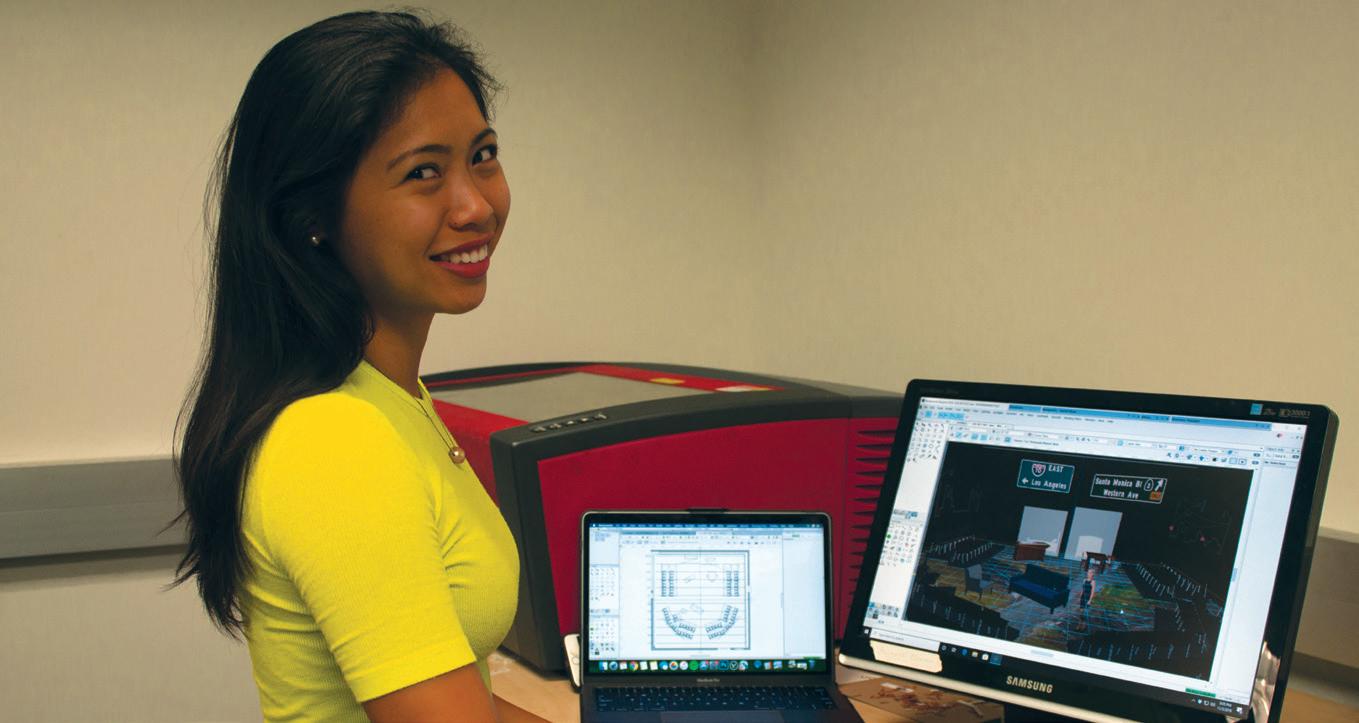
Career Goals: I would love to keep working in theatre as a set designer. I also have an interest and desire to work in event and set design for fashion runway shows.
As a theatre design student, Gretchen Ugalde works with multiple applications and technology. She enjoys taking studio classes offered in the Department of Art, which helps her develop ideas when thinking about designing for the stage. “I love bringing what I’ve learned from art classes to my drafting or theatre design classes,” says Ugalde. “It is a pleasure to create the visuals that style a play and engage with the audience.” Ugalde has been tapped to set design for the drama department’s upcoming production of Living Out in March 2020, a play written by Lisa Loomer and directed by Jane Page. Ugalde uses the applications Vectorworks and Photoshop to communicate her designs to the rest of the creative team. The equipment she appreciates using most is the laser cutter for model making to give her designs the 3D quality to convey her visual design.
Do you have a mentor at Claire Trevor School of the Arts?
Lonnie Alcaraz (Head of the Lighting Program and Interim Head of the Scenic Program in the Department of Drama) is a professor that I am so very thankful to have met in CTSA! His care and attention to his students creates such a wonderful environment to grow as an artist. I am so very grateful for all he has taught me, from my technical skills to how to best carry myself professionally and personally in the theatre industry. I wouldn’t be the theatre artist I am today if not for the training, care and opportunities Lonnie has given me!
Alex Lough
Department of Music Ph.D. in Integrated Composition, Improvisation, and Technology (ICIT). Anticipated graduation, Spring 2020.
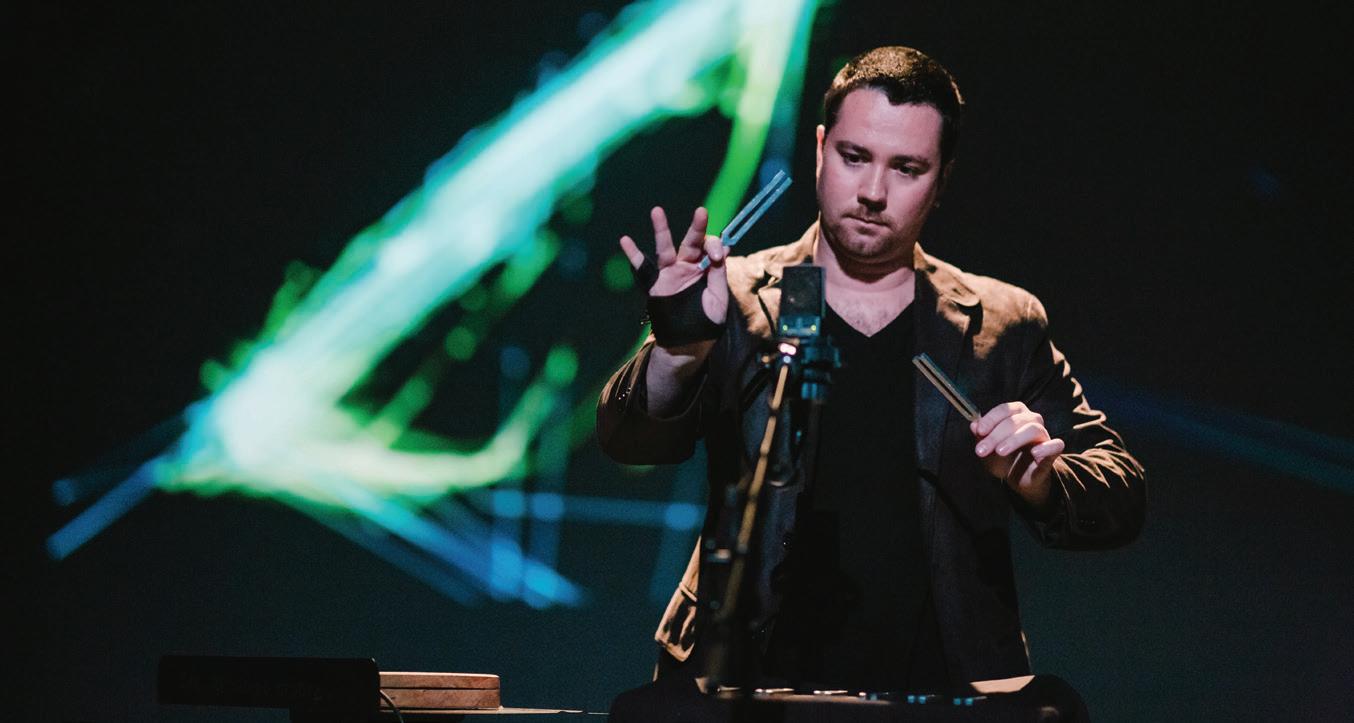
Career Goals: To continue in academia as a professor and practicing musician and sound artist. I love teaching and exposing students and colleagues to my creative practices and engaging in critical discourse about electronic/experimental music.
As a Ph.D. candidate in the ICIT program, Alex Lough has several projects and experiments in the works at once. Lough recently produced the sound installation for American Monument, an exhibition at the Beall Center for Art + Technology. He is also currently working with ICIT Professor Mari Kimura on her MUGIC™ sensor project, a gestural controller that tracks real-time motion data sent via Wi-Fi, through things like acceleration, orientation, and angular velocity. Lough has composed and performed a few pieces using the tools, including a piece with extremely simple sounds to demonstrate how he uses the electronics and sensor. To execute his plan, Lough used only tuning forks, which produce the simplest kind of sound, a single tone that is about as close to a sine wave as you can get. “My hand movement affects various electronic processes in the computer so I can perform naturally without having to deal with pressing pedals or turning knobs,” said Lough. “I just move my hand, and that can control the effects directly.” Lough’s next project is a collaboration with a faculty member to create a new experimental QWERTY keyboard interface that is sensitive to pressure and duration with capabilities such as vocal triggers. Creative technology at work.
Tell us about the resources you use:
CTSA has great tech, spaces and resources, and I try to use as much of it as I can. As an ICIT Ph.D. candidate, I’ve recorded a few albums and EPs with colleagues and professors in our studios, including composing an evening-length work for immersive dance with our vintage modular synthesizers in the CLASSic Synthesizer Studio (Classic Laboratory for Analog Sound Synthesis). I’ve held concerts in the xMPL and made extensive use of all the sound and lighting equipment. I try to be as active as possible in using those spaces, both to record and perform. Having access to studios and high-end gear means I can take more risks and experiment.










